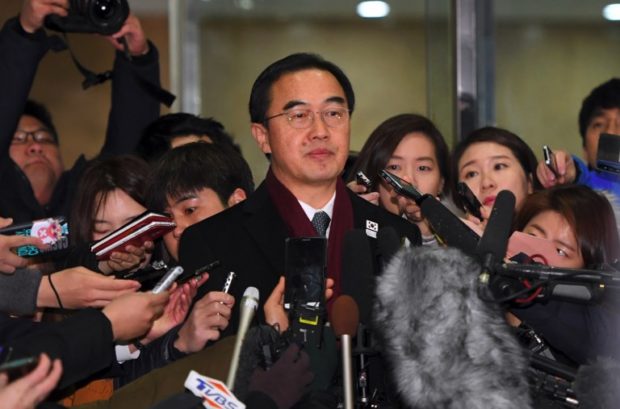Koreas set for first official talks in two years
SEOUL, South Korea — A high-level South Korean delegation left Tuesday for rare talks with North Korea after months of tensions over the North’s nuclear weapons program, with Seoul’s chief delegate vowing to work towards improving long-strained ties.
The talks come after the North’s leader Kim Jong-Un indicated in his New Year’s speech that Pyongyang was willing to send a delegation to the Winter Olympics in the South.
Seoul responded with an offer of a high-level dialogue, and last week the hotline between the neighbours was restored after being suspended for almost two years.
Moments before Seoul’s five-member delegation left for the talks at the border truce village of Panmunjom, Unification Minister Cho Myung-Gyun said the two sides would focus on the North’s participation in the Pyeongchang Games but the agenda would also include ways to thaw frosty ties.
“Today, we will discuss North Korea’s participation in the Pyeongchang Olympics and Paralympics and the issue of improving inter-Korean relations as well”, Cho, who led the South’s delegation, told journalists.
Article continues after this advertisementHe said relations between the two Koreas had been in limbo for a long time.
Article continues after this advertisement“We will do our best to ensure that the Pyeongchang Olympics and Paralympics will take place as a peace festival and that this meeting will serve as the first step for improving South-North ties”, he added.
Seoul has been keen to proclaim the Games in Pyeongchang, just 80 kilometres (50 miles) south of the Demilitarized Zone (DMZ) separating the two countries, as a “peace Olympics” in the wake of missile and nuclear tests by the North — but it needs Pyongyang to attend to make the description meaningful.
If the North agrees, one of the top agenda items will be whether the two Koreas’ sportspeople make joint entrances to the opening and closing ceremonies, as they did for Sydney 2000, Athens 2004 and the 2006 Winter Games in Turin.
The size and membership of the North Korean delegation and their accommodation — widely expected to be paid for by Seoul — will also be discussed.
The group may stay on a cruise ship in Sokcho, about an hour’s drive from the Olympic venue — which would enable their movements to be closely monitored and controlled.
With only a handful of qualified winter sports athletes, North Korea is likely to send significant numbers of cheerleaders to the Pyeongchang Games, which run from February 9 to 25, analysts say.
Hundreds of young, female North Korean cheerleaders have created a buzz at three previous international sporting events in the South.
“For North Korea to achieve its desired effects and to attract attention, it will have to dispatch its beauty cheering squad,” said An Chan-Il, a defector-turned-researcher who heads the World Institute for North Korea Studies.
South Korean reports have suggested the North could send a high-level delegation to the Games including Kim’s younger sister Yo-Jong, who is a senior member of the ruling Workers’ Party.

South Korean Unification Minister Cho Myung-Gyun (C) speaks to the media before his departure to the border truce village of Panmunjom at the government building in Seoul on January 9, 2018.
A high-level South Korean delegation on January 9 left for rare talks with North Korea after months of high tensions over the North’s nuclear weapons, with the South chief’ delegate vowing to creat momentum for thawing inter-Korean ties. / AFP PHOTO / JUNG Yeon-Je
‘Beyond the Olympics’
Cho, the top South Korean official in charge of relations with the North, is a veteran negotiator in inter-Korean affairs.
He has participated in talks with North Korea since the 1990s, including their last summit in 2007.
Pyongyang’s chief delegate Ri Son-Gwon has a similar role as head of the Committee for Peaceful Reunification of Korea.
Ri has mostly taken part in military talks with the South and is known for angrily storming out of one meeting within minutes, denying Pyongyang’s role in the 2010 sinking of a South Korean warship.
As well as the Olympics, the two sides could bring up their own priority issues, which analysts say will be much more challenging.
South Korea wants to discuss the resumption of family reunions but Pyongyang snubbed previous offers, saying it will not consider further reunions unless several of its citizens are returned by the South.
The North will probably want to discuss a permanent end to large-scale annual military drills between Seoul and Washington.
The United States and South Korea agreed last week to delay the Foal Eagle and Key Resolve exercises until after the Games, apparently to help ease nerves.
US President Donald Trump said at the weekend he hoped the rare talks between the two Koreas would go “beyond the Olympics” and that Washington could join the process at a later stage.
But US ambassador to the United Nations Nikki Haley said that there was “no turnaround” in the US stance, reiterating that the North must stop nuclear tests for talks with Washington. /cbb